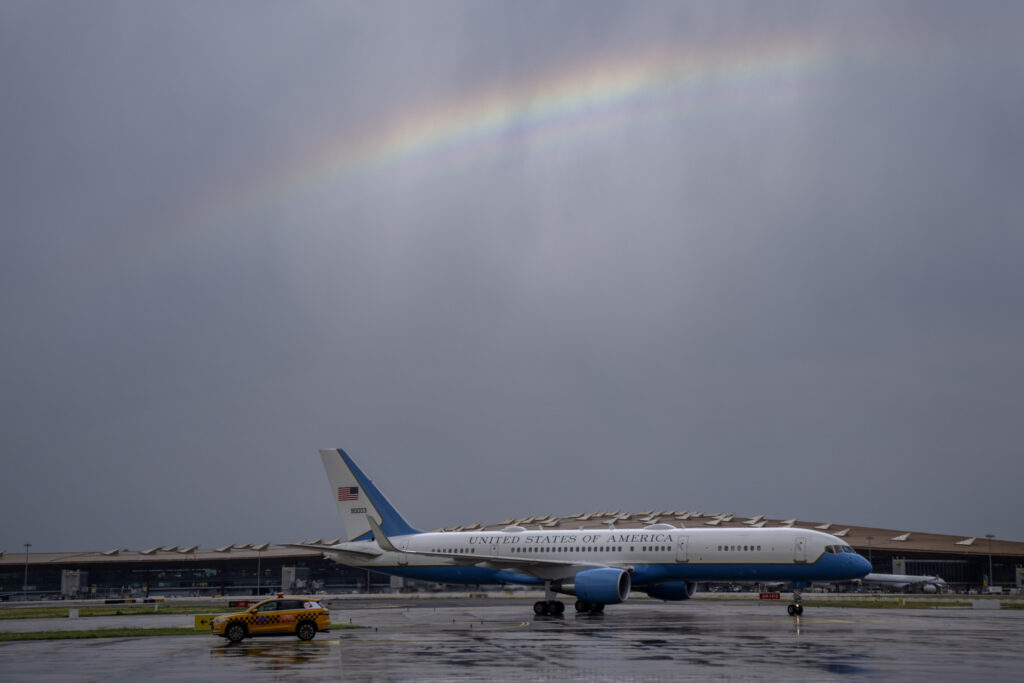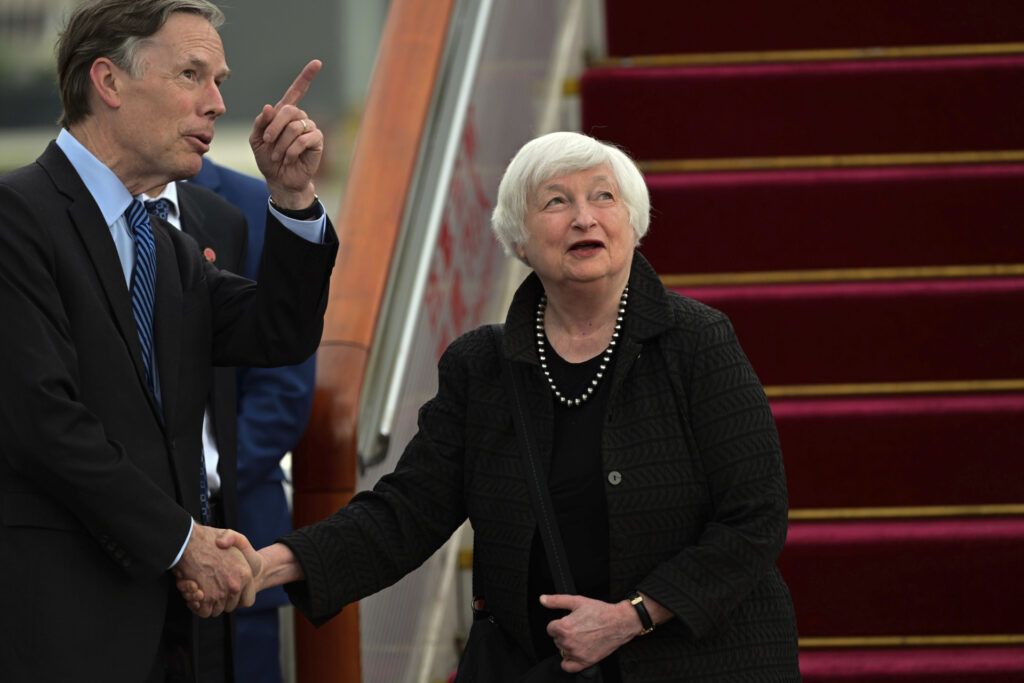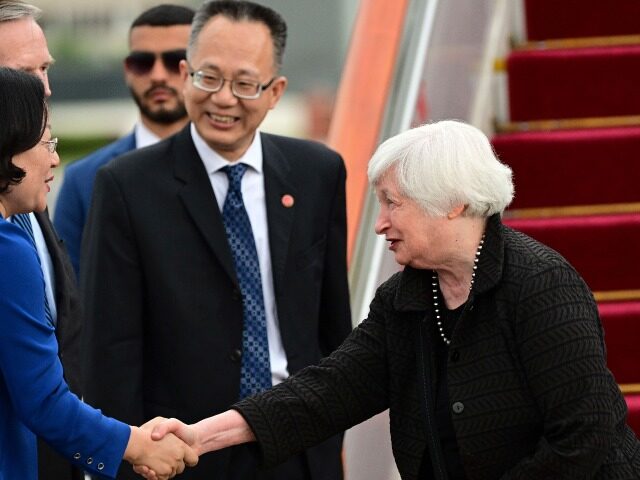Treasury Secretary Janet Yellen arrived in Beijing on Thursday afternoon, beginning a four-day visit that included a meeting with Premier Li Qiang on Friday.
Chinese state media depicted Yellen as listening passively as Communist Party officials lectured her on America’s unreasonable trade practices. Western media quoted her criticizing Beijing’s abusive practices, and the White House managed expectations for a visit that could do little more than pave the way for more fruitful conversations in the future.
China’s state-run Global Times labored mightily to inject some drama into the visit by rhapsodizing about the rainbow that appeared when Yellen shook hands with a Chinese Communist functionary for 20 seconds on the tarmac:
When Yellen landed in Beijing on Thursday, she and Yang Yingming, director general of the International Economic Relations Department at the Ministry of Finance shook hands for nearly 20 seconds. At that moment, a rainbow appeared. Yang and US Ambassador to China Nicholas Burns both guided her to see the rainbow, according to a report by Yuyuan Tantian, a social media account affiliated with state broadcaster CCTV. This is a reminder to the US – China and US relations can see “a blue sky after a storm” only when the two sides show respect and sincerity, the report said.
“There is a silver lining in the cloudy and stormy international atmosphere. It’s time for the US to choose between brightness and darkness,” a net user posted on Twitter-like Sina Weibo on Thursday.
“Yellen has seen a rainbow that means harmony, and will know about Chinese people’s life and the status quo of US companies in China. I believe the positive signs will make the US treasury secretary think how to improve China-US relationship,” Zhou said.

A rainbow is seen as a plane carrying Treasury Secretary Janet Yellen taxis after arriving at Beijing Capital International Airport in Beijing, China, on July 6, 2023. (AP Photo/Mark Schiefelbein, Pool)
The Global Times noted that Yellen is seen as a “relatively friendly figure” on Chinese social media, where users gushed over her impressive chopstick skills.
The rest of the Global Times’ coverage was preoccupied with Chinese ministers telling Yellen that it is foolish to speak of “decoupling” America’s economy from China and urging her to correct America’s “wrongdoings” so bilateral relations can return to “a normal track defined by mutual trust.”
The Global Times eagerly quoted a statement from the Chinese Finance Ministry that praised “win-win cooperation through concrete actions” as a strong response to “the U.S.’ one-sided principles that poison U.S. economic and trade relationships with China as well as the U.S.’ two-faced foreign policy toward China.”
That does not sound like a very friendly greeting for a fabled chopstick expert whose arrival in Beijing was heralded by a burst of rainbows.

US Ambassador to China Nicholas Burns points Treasury Secretary Janet Yellen to a rainbow at Beijing Capital International Airport in Beijing, China, on July 6, 2023. (Pedro Pardo/Pool Photo via AP)
Another Global Times piece on Thursday dismissed Yellen’s visit as largely unimportant, except for the possibility that she could “keep high-level bilateral communication channels open” while the U.S. and China “rebuild mutual trust.”
The Chinese Communist paper said hopefully:
Yellen, who is seen as a voice of moderation in the Biden administration, has been adopting a less hawkish and more pragmatic view on maintaining economic ties with China, opposing additional tariffs and warning that “de-coupling” with the world’s second-largest economy would be “disastrous.”
Of course, China expects the U.S. to do all the heavy lifting on rebuilding mutual trust because Beijing has supposedly committed no offenses and made no mistakes:
The key issues of discussion for both sides during Yellen’s visit would be the cancellation of the US’ additional tariffs on China, the withdrawal of its “301 investigation” into China, and the review of the first phase of the China-US trade agreement, Zhu Min, former deputy governor of the People’s Bank of China and former deputy managing director of the IMF, told the Global Times in a recent interview.
While trade remains the cornerstone of China-US economic relations, the cancellation of additional tariffs on Chinese goods exported to the US is the first issue that needs to be discussed between the two sides, Zhu said.
Some experts also believed that Yellen may address the fiscal and financial issues between the two countries, for example, trying to persuade China to refrain from reducing its holdings of US Treasury bonds and instead increase them at the appropriate time to help the US address its own inflation issues.
As for the export controls on vital chip-manufacturing metals, which China announced as Yellen was departing Washington, the Global Times waved them off as merely a “warning shot to the U.S.” made necessary by America’s insistence on “roping in its allies to escalate the chip war and high-tech crackdown against China.”
“The export control shows that if the U.S. dares to infringe the interests of China, China will strike back so as to give the U.S. a hard lesson,” huffed Chongyang Institute for Financial Studies Senior Research Fellow Dong Shaopeng, as the narrative drifted away from rainbows and never-ending handshakes.
International outlets like Reuters noted Yellen’s approach was conciliatory but not entirely devoid of criticism for China, as she raised concerns about Beijing’s anti-competitive subsidies for state-owned enterprises, its formidable barriers to market access for foreigners, and “punitive actions” against U.S. firms such as the export controls on gallium and germanium.
Yellen also implicitly criticized China’s new Foreign Relations Law, a menacing package of policies intended to trigger automatic retaliation for any attempt to impose sanctions against China’s unfair trade practices, environmental abuses, or human rights violations.
The Foreign Relations Law is reportedly making foreign investors nervous about doing business in China at the very moment Beijing is trying to lure them back after years of crackdowns, lockdowns, and viruses that make lockdowns look reasonable. China’s sudden decision to begin conducting intrusive audits of foreign financial firms and detaining their Chinese employees did nothing to ease those jitters.
Yellen did indeed restate her opposition to “decoupling” from China, insisting the U.S. seeks only “healthy economic competition,” but she also defended restrictions on technology exports to China as necessary to protect national security. She said China’s punitive actions against American companies made it reasonable for them to become less dependent on China for manufacturing.
“We will take action to protect our national security when needed, and this trip presents an opportunity to communicate and avoid miscommunication or misunderstanding,” Yellen said via Twitter when she arrived in Beijing.
we will take action to protect our national security when needed, and this trip presents an opportunity to communicate and avoid miscommunication or misunderstanding.
— Secretary Janet Yellen (@SecYellen) July 6, 2023

COMMENTS
Please let us know if you're having issues with commenting.